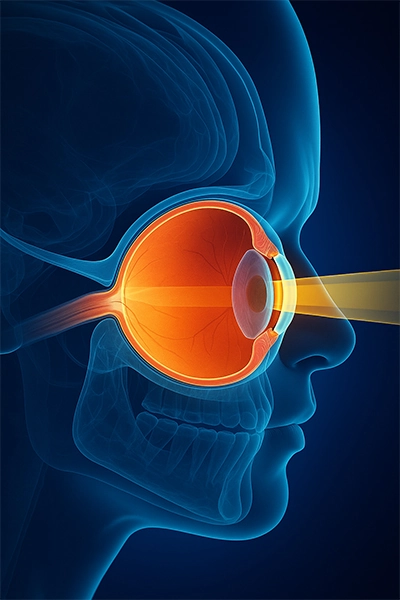
Causes of presbyopia
What causes presbyopia?
Presbyopia is a physiological process related to the natural aging of the eye, particularly the lens. As the years go by, the lens loses elasticity, becoming stiffer and less able to change its shape to focus on close objects.
Loss of lens elasticity
The main cause of presbyopia is the progressive loss of elasticity of the lens, a natural lens inside the eye. When young, it is soft and flexible. After the age of 40, however, it tends to become rigid and unable to focus on nearby objects.
Weakening of ciliary muscles
Another factor is the gradual weakening of the ciliary muscles, which control the lens. Although they are not the direct cause, their reduced efficiency contributes to less support in focusing on close objects.
Age and genetic predisposition
Age is the determining factor, but genetics can also play a role: those with parents who developed presbyopia early tend to have the same problem. Therefore, it is important to have regular check-ups starting around the age of 40.
Lifestyles and visual habits
Factors such as prolonged use of electronic devices, daily visual stress, and prolonged exposure to artificial or UV light can accelerate the onset of the problem.
Secondary and aggravating causes
Some medical conditions
Certain diseases can promote an early worsening of presbyopia, such as:
- Diabetes mellitus
- Hypothyroidism
- Multiple sclerosis
Prolonged use of medications
Prolonged use of certain medications (antidepressants, antihistamines, diuretics) can interfere with the ability to focus on close objects.
When do the first signs appear?
Generally, between the ages of 40 and 45, the first signs of presbyopia begin to appear. It is often noticed when one starts to hold their phone or books further away to read better.
Continue reading
FAQ
- Is presbyopia a disease?
No, it is a natural age-related change. - Can I prevent presbyopia?
It cannot be prevented, but its progression can be delayed with good visual habits. - Does lifestyle affect it?
Yes. Smoking, exposure to bright light, and lack of rest can worsen symptoms.